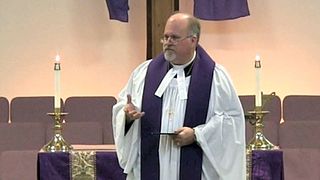Ministry may refer to:
Ministry may refer to:

The Free Methodist Church (FMC) is a Methodist Christian denomination within the holiness movement, based in the United States. It is evangelical in nature and is Wesleyan–Arminian in theology.
Minister may refer to:

Clergy are formal leaders within established religions. Their roles and functions vary in different religious traditions, but usually involve presiding over specific rituals and teaching their religion's doctrines and practices. Some of the terms used for individual clergy are clergyman, clergywoman, clergyperson, churchman, and cleric, while clerk in holy orders has a long history but is rarely used.
Presbyterianpolity is a method of church governance typified by the rule of assemblies of presbyters, or elders. Each local church is governed by a body of elected elders usually called the session or consistory, though other terms, such as church board, may apply. Groups of local churches are governed by a higher assembly of elders known as the presbytery or classis; presbyteries can be grouped into a synod, and presbyteries and synods nationwide often join together in a general assembly. Responsibility for conduct of church services is reserved to an ordained minister or pastor known as a teaching elder, or a minister of the word and sacrament.

The Church of Scotland is the national church in Scotland.

The Church of Norway is an evangelical Lutheran denomination of Protestant Christianity and by far the largest Christian church in Norway. The church became the state church of Norway around 1020, and was established as a separate church intimately integrated with the state as a result of the Lutheran reformation in Denmark–Norway which broke ties with the Holy See in 1536–1537; the King of Norway was the church's head from 1537 to 2012. Historically the church was one of the main instruments of royal power and official authority, and an important part of the state administration; local government was based on the church's parishes with significant official responsibility held by the parish priest.

Ordination is the process by which individuals are consecrated, that is, set apart and elevated from the laity class to the clergy, who are thus then authorized to perform various religious rites and ceremonies. The process and ceremonies of ordination vary by religion and denomination. One who is in preparation for, or who is undergoing the process of ordination is sometimes called an ordinand. The liturgy used at an ordination is sometimes referred to as an ordination.
The Evangelical Lutheran Church in America (ELCA) is a mainline Protestant Lutheran church headquartered in Chicago, Illinois. The ELCA was officially formed on January 1, 1988, by the merging of three Lutheran church bodies. As of 2021, it has approximately 3.04 million baptized members in 8,724 congregations.
In religious organizations, the laity consists of all members who are not part of the clergy, usually including any non-ordained members of religious orders, e.g. a nun or a lay brother.
Church may refer to:

In Christianity, a minister is a person authorised by a church or other religious organization to perform functions such as teaching of beliefs; leading services such as weddings, baptisms or funerals; or otherwise providing spiritual guidance to the community. The term is taken from Latin minister. In some church traditions the term is usually used for people who have ordained, but in other traditions it can also be used for non-ordained people who have a pastoral or liturgical ministry.
Apostolic may refer to:
The National Association of Congregational Christian Churches (NACCC) is an association of about 400 churches providing fellowship for and services to churches from the Congregational tradition. The Association maintains its national office in Oak Creek, Wisconsin, a suburb of Milwaukee. The body was founded in 1955 by former clergy and laypeople of the Congregational Christian Churches in response to that denomination's pending merger with the Evangelical and Reformed Church to form the United Church of Christ in 1957.
Youth ministry, also commonly referred to as youth group, is an age-specific religious ministry of faith groups or other religious organizations, usually from ages 12 to 30, whose mission is to involve and engage with young people who attend their places of worship, or who live in their community. Christian youth ministry usually encompasses one or more of the following:
Pastoral care is an ancient model of emotional, social and spiritual support that can be found in all cultures and traditions. The term is considered inclusive of distinctly non-religious forms of support, as well as support for people from religious communities. It is also an important form of support found in many spiritual and religious traditions.

Ministry: International Journal for Pastors is an international monthly magazine for Christian ministers, with a circulation of approximately 78,000. It is published by the Ministerial Association, an official body of the worldwide Adventist church. It is aimed at pastors and ministers of the Seventh-day Adventist Church, and also those of other denominations. It has a monthly circulation of roughly 18,000 to Adventist church leaders, and a bi-monthly circulation of roughly 60,000 to clergy from other denominations on a complimentary basis. As of 2011 it was edited by Derek Morris. The current editor is Pavel Goia. Its ISSN is 0026-5314.
The Constitution of Mongolia provides for freedom of religion, and the Mongolian Government generally respects this right in practice; however, the law somewhat limits proselytism, and some religious groups have faced bureaucratic harassment or been denied registration. There have been few reports of societal abuses or discrimination based on religious belief or practice.
The ordination of lesbian, gay, bisexual and/or transgender (LGBT) clergy who are open about their sexuality or gender identity; are sexually active if lesbian, gay, or bisexual; or are in committed same-sex relationships is a debated practice within some contemporary Christian denominations.
The government of the Soviet Union followed an unofficial policy of state atheism, aiming to gradually eliminate religious belief within its borders. While it never officially made religion illegal, the state nevertheless made great efforts to reduce the prevalence of religious belief within society. To this end, at various times in its history it engaged in anti-religious persecutions of varying intensity and methodology. Believers were never officially attacked for being believers, but they were officially attacked for real or perceived political opposition to the state and to its policies. These attacks, however, in the broader ideological context were ultimately meant to serve the ultimate goal of eliminating religion, and the perceived political opposition acted as a legal pretext to carry this out. Thus, although the Soviet Union was officially a secular state and guaranteed freedom of religion in its constitutions, in practice believers suffered discrimination and were widely attacked for promoting religion.
Public ministry may refer to: